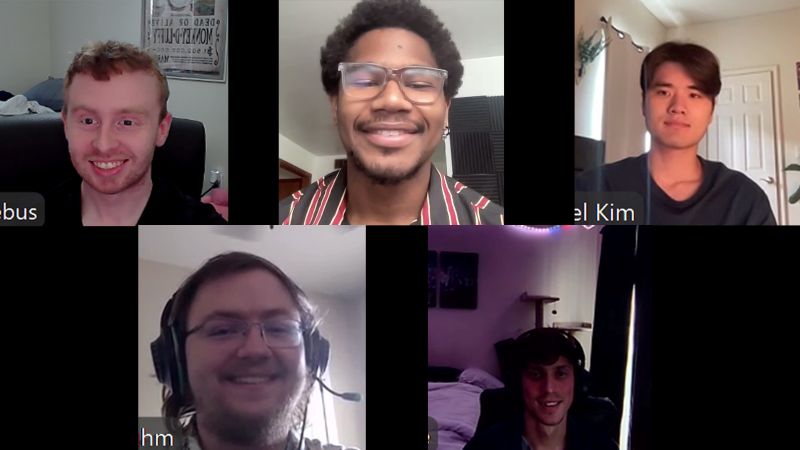June 08, 2025
One group of Mizzou IT students integrated artificial intelligence (AI) into a video game to make it less predictable and increase immersion into their virtual world.

A student’s Mizzou Engineering experience isn’t complete without a hands-on capstone project. These group projects encourage information technology students to solve problems they’re interested in and give them free reign to design an innovative solution they think the world needs.
One group of students, including Brian Bluhm, Ben Dargue, Kenneth Jackson, Daniel Kim and Aaron Trebus integrated artificial intelligence (AI) into a video game to make it less predictable during a replay.
“Often, when players replay a game, the experience is predictable and repetitive,” Dargue said. “We aimed to solve this by integrating AI to create a dynamic, evolving game that changes with each session.”
Hear from the students to learn more about their project.
Our group set out to address the issue of limited replay ability in video games.
Dargue: By using AI-driven interactions, we can safely say that no two playthroughs will be identical, offering a unique experience for every player, every time.
We also wanted to explore how AI could be implemented in a way that gives the player a deeper feeling of immersion. We focused on a game where players interrogate suspects, with AI adjusting its responses based on the investigation generated and its role(s) in the investigation. The goal was for these interactions to feel more natural and believable so that the player truly feels they’re participating in an investigation.
To us, this project represents more than just a unique gameplay mechanic, with infinite replay ability and adaptable gameplay; this has potential applications beyond entertainment. Such games could serve as a prototype for future training tools for law enforcement, military, psychology and more.
It took a week to brainstorm the idea for our police interrogation game.
Trebus: When we first talked about our strengths and weaknesses, we landed on doing something related to video games and AI as those were our biggest areas of overlap. I came up with the idea, thinking it would be a straightforward concept that could allow for us to experiment with a format of game that’s relatively new. It offered an experience that was both achievable and innovative enough so that we could really show our talents.
We started out each taking a task of our own.
Jackson: Everyone had an idea of what they were looking forward to working on based on their background experience, with some members taking AI Integration, asset building, scene generation, user interfacing and backend coding. Members with knowledge in certain areas worked with others who did not have the same knowledge to get everyone up to speed on what and how everything in the game is being built. This enhanced the development phase, since everyone understood future additions and changes based on this shared knowledge of how we started.
Some tasks, such as connecting the game to OpenAI’s API, involved more extensive development and was largely written separately from the rest of game development. Once it was complete, the whole team worked to incorporate and further enrich the gameplay experience with its addition. With time, version control and strong communication, we were able to work past each roadblock we encountered.
We learned things won’t always go as planned.
Kim: Based on my background, Unity and this entire AI setup was new. I had to use all the guides I could get. We had many bugs and errors that, as a team, we had no clue why they were happening. A few times, we had to communicate and go back a page or two and restart.
At the end of the day, we made this awesome project. As we move on from college into this tech world, anything could come our way, from new updates to impossible tasks. Our jobs as future engineers are to keep our heads up and solve these problems.
The game came out great.
Trebus: We evolved our game design skills heavily over the course of the semester and made something that I would say is almost worthy of being put on a digital storefront. We were able to implement aspects of game design that we had heard about but rarely got to put into practice before now. It was very interesting, and I think we did a very nice job.
Learn more about spring 2025 capstones at Mizzou Engineering!